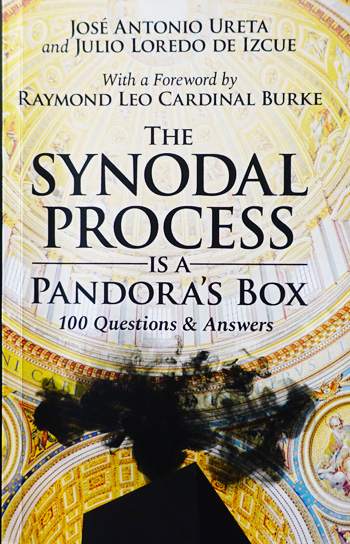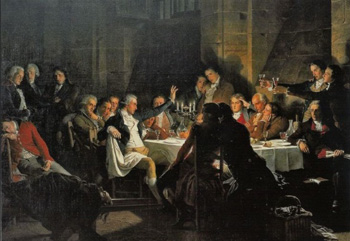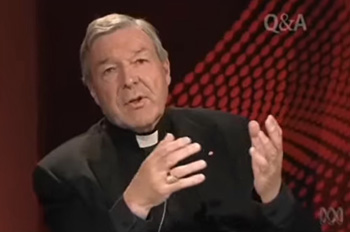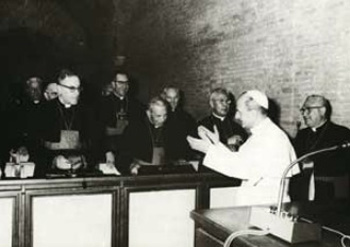Book reviews
 |
 |
 |
 |
 |
 |
 |
A Girondin Reaction against the Synod
Book review of The Synodal Process Is a Pandora's Box by José Ureta & Julio Loredo, Spring Grove: American TFP, 2023, 100 pp.

The book has many indisputable qualities that I praise with satisfaction. Among them is the very good research the authors did to bring to light an expressive number of Catholic scholars, Prelates and priests who are fearlessly voicing their criticism of Francis and the coming Synod.
They are numerous and have or had important positions in the post-conciliar Church, which signifies that they cannot be dismissed with a simple “Do not worry, they are radicals,” as the progressivist would like to do.
The Girondin boat
Francis’ despotic and radical program to destroy the Church is raising reactions that are growing everywhere. Even though this response is taking place among ecclesiastics and scholars favorable to Progressivism – they take as granted Vatican II, the New Mass, New Canon Law, New Canonizations, Situation Ethics, etc – they believe that Francis is “too much.”
This means that the present Pontiff is polarizing the Revolution in the Church into two groups: one of radicals who follow him enthusiastically; another of moderates who do not agree with him and instead hold up Benedict XVI and John Paul II as models of “progressivist moderation.”

The Girondins in prison the night before
their execution by the Jacobins
Now, the two authors of Pandora's Box – and the TFP directors with them – seem to have forgotten that both parties – the radicals and moderates – are progressivists. The authors seem to be naïvely dreaming that the scholars and Bishops they quote are counter-revolutionaries. They positively are not.
Card. Raymond Burke, who wrote the preface for their book, is a 100% partisan of Benedict XVI, Vatican II, the Novus Ordo Mass, etc. In Moral issues he allowed voting for pro-abortion politicians. He also approved a religious order for women, the Franciscan Servants of Jesus, whose founder was a transgender man who became “sister” Julie Green (here and here).
Card. Gerhard Müller, who the authors seem to consider a great hero, is a declared disciple of Gustavo Gutierrez, one of the founders of Liberation Theology, and in dogmatic matters Müller denies the perpetual virginity of Our Lady.

Card. Pell denying the dogma of Original Sin: ‘It is a sophisticated mythology’
These are just some expressive samples of the progressivist tendencies of the Prelates and scholars quoted in Pandora's Box.
So, the sad reality is that the TFP authors entered the bark of moderate Progressivism to try to lead it against Francis and his Synod.
It is an error of tactics, to say the least, similar to one that the followers of St. Athanasius would have committed had they tried to lead the Semi-Arians against the Arians. Or yet, if the followers of St. Ignatius were to ally themselves with the Jansenists to combat the Protestants.
Bonum est integra causa; malum est quocumque defectu [Good is the integrity of the truth; evil is any concession]. A Catholic is one who defends the integrity of the Catholic Faith…
No attack against Progressivism
As it often happens with counter-revolutionaries who compromise with the Revolution, the authors hid the real enemy and the good doctrine in order to not displease their new allies. Doing this, they effectively sheltered the enemy and dissembled the truth.
Therefore, in the entire book I could not find any clear attack against Progressivism, which was not even mentioned. In other words, the current of thought that encompasses all the errors that the Counter-Revolution has been combating for about a century under the leadership of Plinio Corrêa de Oliveira, was not even mentioned.

Paul VI inaugurating the first Synod in 1967; he had established them on September 15, 1965
Now then, the reality is utterly different. Francis is merely one in a string of conciliar Popes who is continuing the plan of destruction set in motion by Progressivism long ago and put into practice by Paul VI in 1965 when he decided the Synods should exist. Paul VI, John Paul II and Benedict XVI did everything they could to reach the goals Francis is striving to attain at a very fast pace now.
These three Pontiffs using their papal authority caused a great deal of destruction in the Church (here, here, here and here). However, for different reasons, they did not achieve her entire destruction; significant remnants still stand. Francis is now rushing to destroy – with or without Synods – what is still standing of the pre-conciliar Catholic Church.
No attack against Vatican II
Another point shamefully omitted in Pandora's Box: Nowhere do the authors point to Vatican II as the landmark for the destruction of the Church and all the bad effects the coming Synod will purportedly produce. Once or twice Vatican II is mentioned in passing, but without any special negative note.
Two dishonest approaches
Whoever has followed the history of the Church in the last 60 years knows that so far the Synods have not achieved the objective for which they were created: to implant democracy in the Church. They are strictly planned bureaucratic meetings that allow little opportunity for the participants to freely express their thoughts. Everything – including the questions sent to “the people of God” – is controlled by a small group, which cooks and serves the answers of the people and the Bishops the way it desires.

The Synods from 1967 to 2015
Now then, the authors of Pandora's Box are surfing on this wave of pre-Synod propaganda and taking advantage of it in two fraudulent ways:
- Like the progressivists, they greatly exaggerate the
significance of the Synod – dramatically declaring it “a de facto Third Vatican Council.” (p. 1). So, if the Synod ends like the previous ones in having few practical effects, they are ready to present themselves as the heroes who prevented the Apocalypse from happening. If they do it, it will be a dishonest procedure.
- By depicting the coming Synod as a Third Vatican Council and greatly augmenting its danger, they virtually excuse themselves for not saying a word against the Second Vatican Council, which is the real cause of all the evils they attribute to the Synod. I think this tactic is intended to cover for TFP’s decades-long failure to defend the Catholic Church from the real enemy. This is a cowardly conceived bluff.
They have rejected the perennial ideals defended by Plinio Corrêa de Oliveira of fighting Progressivism without any possible compromise. Tired of the silence, ostracism, ridicule and persecution that this position brings, they are taking advantage of Francis’ radical agenda to present themselves as the saviors of the progressivist middle-of-the-road ecclesiastic establishment.
This is the seal of their defection. This is the key to their success.

Posted September 18, 2023
______________________








